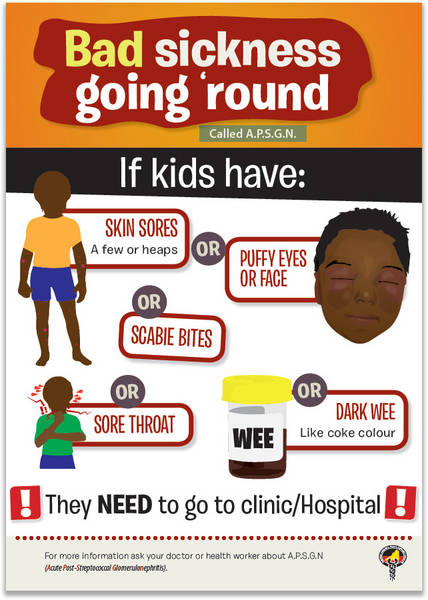Acute Post Streptococcal Glomerulonephritis (APSGN) outbreak declared in the Kimberley
 APSGN poster
APSGN poster
WA Country Health Service (WACHS) Kimberley public health staff are advising Kimberley communities that there is currently an outbreak of Acute Post Streptococcal Glomerulonephritis (APSGN) in the Kimberley region primarily affecting Aboriginal children aged between two and 13 years. Younger children, adolescents and adults can also be affected.
APSGN is a kidney disease that can develop after certain skin and throat infections. You cannot give APSGN to other people, however, the bacteria that cause the skin infections and sore throats can be passed from person to person.
WACHS Clinical Nurse Manager Disease Control Ashley Eastwood said while APSGN is most common in children, adults are more likely to have long-term health problems if they get it as APSGN may contribute to chronic kidney disease in later life.
"There is no simple treatment for APSGN and the prevention of streptococcal skin and throat infections remains the most important control strategy," Ms Eastwood said.
What parents/carers/families should do to prevent the bacteria that leads to APSGN from spreading
- Get all skin sores treated quickly; keep skin clean by washing with soap and water every day.
- Cover all skin sores with a clean dressing.
- Go to your local health clinic or hospital straightaway if your child or family member has:
- Dark, coke coloured urine
- Puffy eyes, a swollen face or swollen feet
- Headache
- Fever
- Tummy pain or swelling
Children diagnosed with APSGN will require admission to hospital for management of high blood pressure and other symptoms caused by APSGN.
For more information, please contact the WACHS Clinical Nurse Manager Disease Control Ashley Eastwood on 9194 1643.
WACHS Media contact: Fran Lyons, 6145 4166

